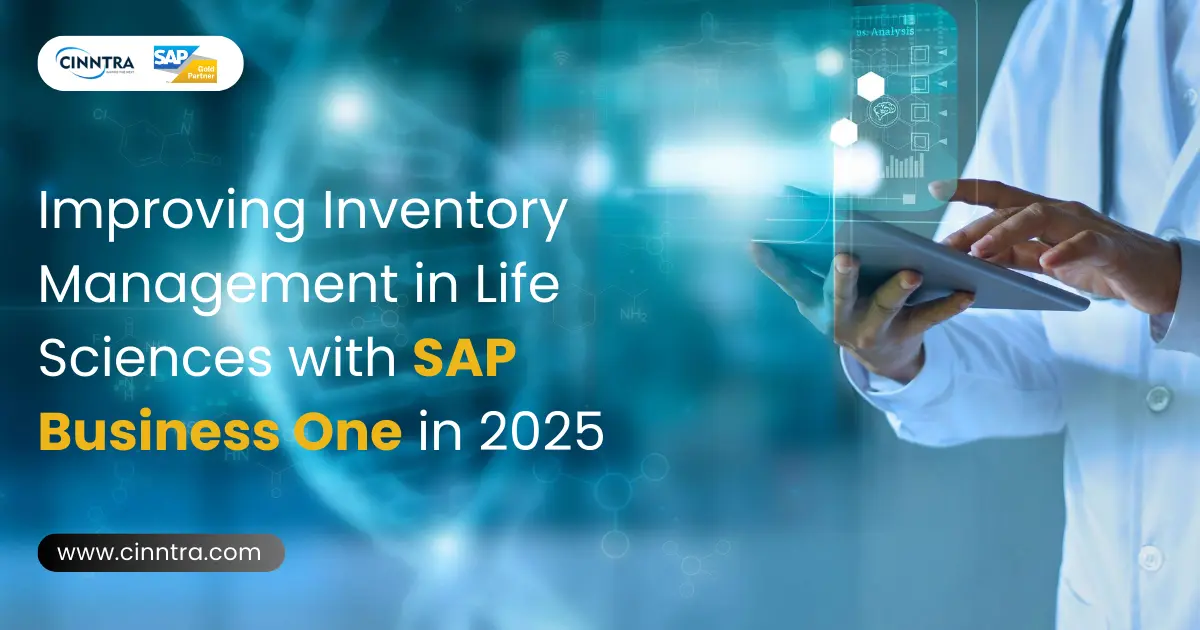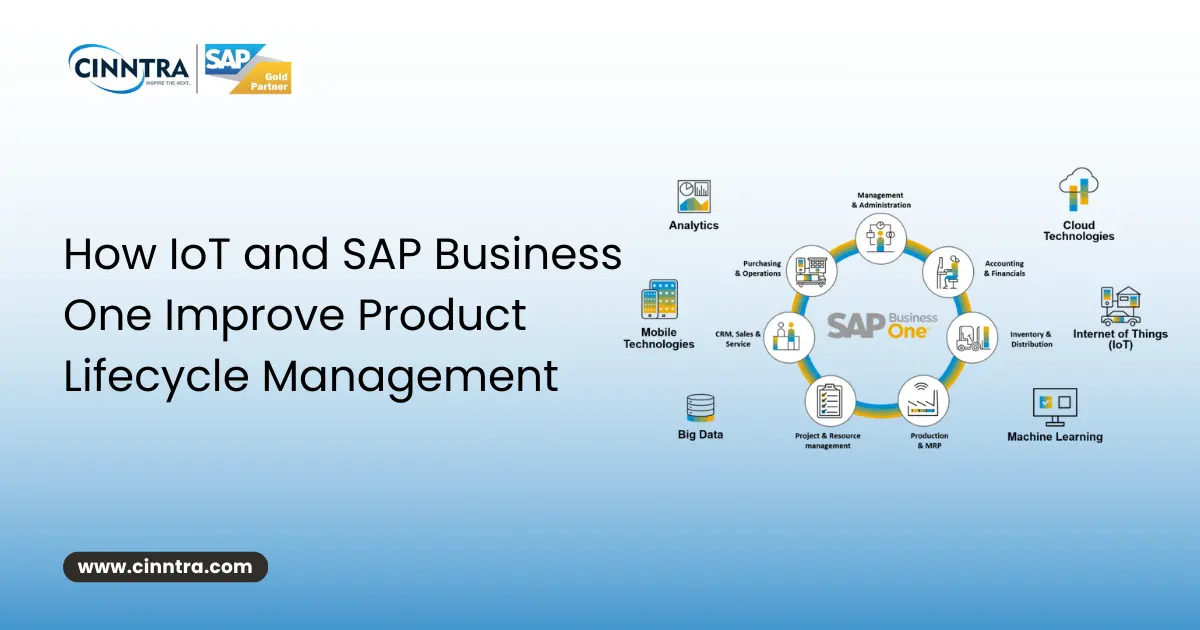Improving Inventory Management in Life Sciences with SAP Business One in 2025

The fusion of Life Sciences with cutting-edge technology has laid the foundation for propelling your business to new heights. Adding technologies gives you the ability to meet unparalleled expertise for better productivity.
SAP Business One Software becomes a game changer in making a positive impact by optimizing the business process and operations. It has tailor-made modules like supply chain and inventory control that serve well for the Life Sciences sector.
Further, great modules like sales and distribution, materials management, financial management, and production planning improve critical business processes within a few weeks.
Top Reason SAP Business One Improves Inventory Management in Life Sciences
SAP B1 for Life Science industry with accelerated time-to-market and optimized resource allocation for innovative products by centralizing automated workflows.
It helps to tackle the nuances of medical devices, biotechnologies, pharmaceuticals, and various other functions. Moreover, this sector needs solutions that work in dynamic environments with stringent regulatory requirements.
The Life Sciences industry strives for continuous innovation while maintaining complex supply chains. Healthcare ERP Solutions must have all the modules available to match the organization's needs.
1. Procurement Process
The SAP B1 Procurement module automates the procurement process for Life Sciences companies by providing comprehensive visibility and control. It covers all stages ranging from supplier sourcing, request for quotation (RFQ), purchase order creation, and invoice verification. This automation streamlines procurement activities by ensuring compliance policies.
Thus, it enhances negotiation capabilities with suppliers. As a result, organizations can achieve significant cost savings while maintaining high standards of quality and efficiency.
2. Supplier Collaboration
Collaboration with suppliers is essential in the Life Sciences sector because of quality and reliability constraints. The SAP Business One Software facilitates effective communication by allowing for transparent information exchange and quick resolution of supply chain issues.
Companies can strengthen partnerships and maintain a dependable supply chain with real-time insights into supplier performance and delivery timelines. It ultimately ensures the company meets regulatory standards and customer expectations.
3. Inventory Management
Effective inventory management is indispensable in the Life Sciences industry to prevent stock-outs or overstocking which can fluctuate production and product distribution. The SAP Inventory management module enables real-time tracking of consumption rates, inventory levels, and replenishment needs.
It has features such as automatic stock replenishment and optimized material storage to help organizations maintain the right balance between supply and demand. This capability improves operational efficiency while reducing carrying costs by ensuring that resources are available when needed without excess waste.
4. Quality Management
Product quality and safety are one of the critical aspects of the Life Sciences. The SAP Business One Software manages the goods receipt and inspection processes to ensure compliance with regulatory standards. Organizations can quickly identify and address quality issues by integrating quality data throughout the procurement cycle.
This agile approach mitigates risks associated with non-compliance to safeguard patient health by ensuring that only safe and high-quality products are delivered.
5. Demand Forecasting
The SAP B1 modules leverage historical data, market trends, and sales insights to speculate future demand accurately. This capability allows organizations to adjust their production schedules by reducing the risk of stock-outs or excess inventory.
Moreover, companies can enhance customer satisfaction while optimizing operational efficiency to ensure a steady supply of products that meet market demands.
6. Production Scheduling
Efficient scheduling is vital for maximizing resource utilization by minimizing lead times in the Life Sciences sector. The SAP ERP for life sciences facilitates agile scheduling of production orders based on real-time demand and resource availability. However, this flexibility ensures optimal use of manufacturing facilities that reduce idle time and enhance production efficiency.
Organizations can respond quickly to changing market conditions while maintaining high-quality standards by aligning production closely with demand signals.
7. Batch Management and Traceability
Regulatory compliance is necessary in the Life Sciences industry where product quality must be assured at every production stage. SAP Business One support batch management to ensure that products are manufactured according to predefined specifications. Further, the system provides end-to-end traceability by allowing organizations to track the life cycle of every product.
This capability is essential for effective quality control and recall management by enabling swift action in case of any issues.
8. Resource Planning
Effective resource planning is a key component of production planning and control (PPC) in the Life Sciences sector. The SAP Business One financial management provides valuable insights into resource availability, labor requirements, and machine capacities. Organizations can minimize production bottlenecks while achieving higher output levels.
However, it is achieved without compromising product quality by optimizing resource allocation based on these insights. This strategic approach ensures that resources are utilized efficiently throughout the manufacturing process.
9. Real-time Monitoring and Analytics
Real-time monitoring of production processes is essential for maintaining operational effectiveness in the Life Sciences industry. The SAP B1 provides key performance indicators (KPIs) for insights into manufacturing efficiency. Advanced analytics capabilities enable organizations to identify areas for improvement quickly to assess overall production performance accurately.
10. Quality Planning
The SAP Business One Software provides comprehensive quality planning processes for Life Sciences companies. Organizations can define quality inspection points, sampling procedures, and control specifications tailored to each product or process.
However, companies can proactively prevent quality issues from arising while ensuring consistency in product performance across their offerings. This helps you integrate quality planning with procurement and production activities.
Managing non-conformances helps prevent defective products from reaching customers in the Life Sciences industry. The SAP Business One Software provides a structured framework for addressing standards from initiation through root cause analysis to corrective action planning.
Add SAP B1 Solution to Make Life Sciences Venture Stand-out!
The pharmaceutical industry demands compliance, adaptability, and precision. Therefore, adding Healthcare ERP solutions is often suggested as one of the best options to fulfill these requirements.
Further, Life science businesses need a holistic solution that involves improved quality control, optimized operations, and a quick production life cycle.
Implementing SAP B1 Solution helps pharmaceutical manufacturers to position themselves as successful venture on the path of efficiency and innovation.



0 Comments